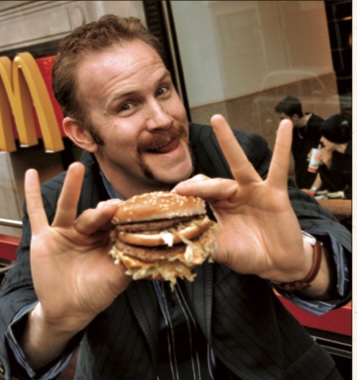BY MARK HAWTHORNE
While countless doctors and nutritionists indicate fast food is a major contributor to poor health, Americans rely more than ever on fast-food restaurants for their nutritional needs, and they have the waistlines to prove it. U.S. consumers have come to count on the convenience and uniformity companies offer in the form of cell phones, overnight deliveries, and, of course, instant hamburgers and sodas. Corporations naturally regard this hunger for quick meals as a tremendous source of revenue; in fact, Americans now spend $110 billion a year on fast food–up from $3 billion 30 years ago.
Into this drive-through culture enters the affable filmmaker Morgan Spurlock, who spends one month eating nothing but food from McDonald’s and documenting both the culture of corporate foodservice and the transformation his body undergoes as he ingests 5,000 calories a day. The resulting film, Super Size Me (www.supersizeme.com), received more 2004 film accolades than we have room to mention, was a hit in theaters and is now available on DVD.
Super Size Me (rated PG-13) was inspired by a 2002 news story about two girls suing McDonald’s for making them fat. When Spurlock heard McDonald’s defend their food as nutritious, he decided to test the claim, figuring that if the food was indeed healthy, he should be able to eat it every day with no ill effects. As he examined the McDonald’s marketing machine, which is aimed squarely at children, Spurlock began to think there might be more at play here than a country full of insatiable gluttons. Thus the movie follows him across America not only to McDonald’s for his daily meals, but to often funny, sometimes alarming visits with doctors, advertising executives, lawyers, consumers, and a lobbyist for the food industry. Alas, no one from McDonald’s would return his calls–they had no doubt seen Michael Moore make fools of spokespeople in his confrontational documentaries.
The warped genius of Super Size Me is that in exploring the link between junk food and obesity, Spurlock goes to extraordinary lengths to become dangerously unhealthy in an accelerated time frame. He eats every breakfast, lunch, and dinner at McDonald’s for 30 days straight; he “super sizes ” his order whenever asked–that is, he buys a larger portion of fries and soft drink at a slight price increase; and he eats every item on the McDonald’s menu at least once. He also mimics the lack of exercise the average American gets by keeping his physical activity, even walking, to a minimum. Consequently, the six-foot-two-inch Spurlock, 33, goes from a healthy 185 pounds to 210 pounds, his cholesterol increases from 168 to 230, and his liver reacts as if he was binge drinking liquor. His doctors are amazed by his swift decline and urge Spurlock to stop his experiment, especially after he develops chest pains and has trouble breathing.
Spurlock wants to present a strong indictment of corporate practices, and for the most part he succeeds. As Eric Schlosser reminds us in his 2001 book Fast Food Nation, which exposed the factory farms and assembly-line procedures behind the fast-food industry, 30 years ago farm activist Jim Hightower warned of “the McDonaldization of America ” in which the huge, multinational corporations behind food service retailers would become a threat to independent restaurants, running them out of business with a cheaper, more efficient delivery system. Today, McDonald’s is one of the world’s most recognized brands.
Spurlock uses considerable humor and fascinating facts to show that McDonald’s offers plenty of food with dubious nutritional value and that they market to children with their restaurant playgrounds, happy meals, toys, cartoons and clown mascot. But he fails to address the role that adults play in this scenario: they have the power to simply not take their kids to McDonald’s. Unfortunately, it’s more difficult for parents to monitor what children eat in school cafeterias, and the documentary shows students eagerly giving in to the lure of fries and sodas.
McDonald’s called Spurlock’s film “a super-sized distortion of the quality, choice and variety available at McDonald’s.” Yet, the company quickly revamped their menu, offering more salads and phasing out their super size menu options–and then claimed Super Size Me had nothing to do with their decision. With bonus features that include a lively audio commentary by Spurlock and Jamieson, an interview with Schlosser, and a graphic demonstration of how long it takes junk food to decompose (ten weeks into that experiment, the McDonald’s french fries still looked fresh), this DVD is definitely food for thought. Just don’t watch it while eating.


